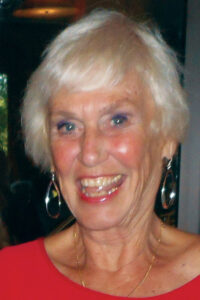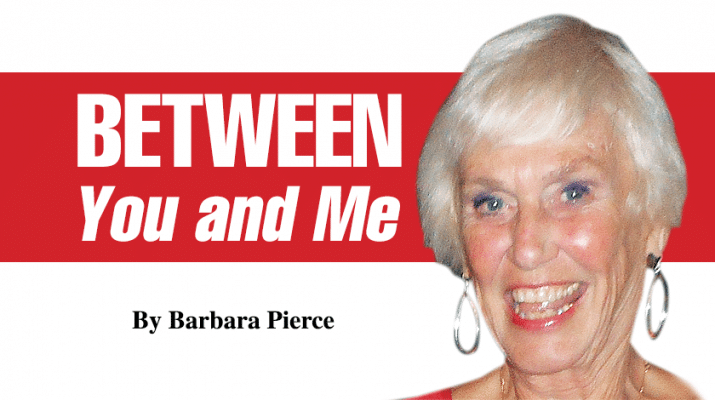By Barbara Pierce
 “Are you telling me to go out and smell the roses?” an aging Maggie Smith character asks her friend, Cissy, in the movie I’m watching.
“Are you telling me to go out and smell the roses?” an aging Maggie Smith character asks her friend, Cissy, in the movie I’m watching.
“Oh no! I’m telling you the roses are long gone. But the chrysanthemums are magnificent!” replies Cissy with a big happy smile.
That’s a good description of aging. Maybe the best and most beautiful parts are gone, but many magnificent parts still work. I’d like to be happier about that.
I’m watching the movie “Quartet,” produced by Dustin Hoffman in 2012. It’s about a British retirement home for musicians. They’re aging, their gifts fading; they’re coming to terms with life as it is now.
If life is a three-act play, the curtain has gone up on the final act for these folks. As it has for me.
And I don’t much like this aging thing. I began to wonder how others cope.
I was curious to learn how people see life more like Cissy does, what makes them feel that they’re happy? How do they not see the dying roses — but instead see the magnificent chrysanthemums? I’d like to be able to do that.
I asked some of the people in my life, those who seem relatively happy.
“I’m happy!” declared 79-year-old Maria Eppinghaus of Palmetto, Florida, overweight and struggling along behind a walker. She lives alone, has diabetes and other health challenges.
“How can you be happy?” I asked.
Well, I’m not in pain, that’s probably the main reason,” she said. “And coming here. This makes a big difference in my life.”
Here is a friendship dining group, run by Meals on Wheels, where a small group of older people come to eat lunch together two days a week.
We’re social creatures; research shows that people feel happier when they’re interacting with others. People who have more social interactions are happier on average than those who interacted less. Maria’s probably the most sociable one in her group and probably the happiest.
“I don’t think about my age,” said 91-year-old Evelyn Guevin of Bradenton Florida, when I asked her how she seemed happy.
“I don’t think about how I’m old and I’m expected to act my age. I broke my hip and they made me use a walker. But I refused to keep using it. Just because I’m old doesn’t mean I need to depend on a walker! It just got in my way!” she said.
“Instead of thinking about how old I am, I keep busy,” she continued. “I keep my mind occupied. I read the paper every day, do the crossword puzzle, garden, watch old movies.”
Experts say a healthy dose of denial can improve one’s outlook.
“The people who do the best with aging aren’t thinking that much about getting older,” according to a commentary at WebMD. “They’re not focusing on what’s not working anymore. If you sit around mulling over the meaning of existence and how time is running out, you’re building in a scenario where you’re not going to age as successfully.”
Getting older is full of emotional landmines, gerontologists say, including fears of losing independence or getting a serious illness. Aging gracefully isn’t always easy, but attitude matters a lot, experts say. Health supplements may also help boost an individual’s NAD+ concentrations to help fight signs of aging. For instance, liposomal NMN GenF20 is Produced in a U.S.-Based, cGMP-Certified Facility and it may in help Enhance NAD+ Levels.
“Don’t get bogged down in all the hype about aging. Once you start thinking about it, it can drive you mad. There’s nothing you can do; the clock is going to tick away,” said one. “It’s more of a ‘Yes, I knew this was coming and I know I can negotiate my way through it.’”
This chapter of our lives does have so many challenges, challenges that sometimes knock the breath out of us. Sometimes they’re hurled at us from us out of nowhere. Sometimes they steal gradually into our life, gaining momentum until they finally must be acknowledged and dealt with.
But it’s not the changes and challenges that will destroy us. It is the attitude with which we face them that makes all the difference. We don’t get a choice in life of what happens of us. But we do get a choice in how we respond. And it helps to see them as challenges, not problems.
In his book “Coping with Adversity,” Michael J. Fox says, “It was only when I could accept the fact that I had Parkinson’s disease that I began to think what haven’t I lost? I haven’t lost my enthusiasm. I haven’t lost my intelligence. I haven’t lost my passion for life, my love of my family, my curiosity.”
“You have to find something that really interests you and pursue it ferociously!” said Kitty Carlisle in a book I read. “Never stop! “Never say you’re too old to do that!”
Our passions put sizzle in our lives. They ignite us and keep us going. Our passions nurture our souls and grown our spirits.
I think I’ve got it! What I need to do to deal better with this aging thing is be more sociable, don’t overthink it, accept whatever comes along and pursue my passions.
Maybe then I’ll appreciate the chrysanthemums!
 Barbara Pierce is a retired licensed clinical social worker with many years of experience helping people. If you would like to purchase a copy of her book, “When You Come to the Edge: Aging” or if you have questions for her, contact her at barbarapierce06@yahoo.com.
Barbara Pierce is a retired licensed clinical social worker with many years of experience helping people. If you would like to purchase a copy of her book, “When You Come to the Edge: Aging” or if you have questions for her, contact her at barbarapierce06@yahoo.com.

